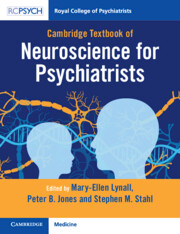Book contents
- Cambridge Textbook Of Neuroscience for Psychiatrists
- Reviews
- Cambridge Textbook of Neuroscience for Psychiatrists
- Copyright page
- Contents
- Contributors
- Introduction
- 1 Cells
- 2 Neurotransmitters and Receptors
- 2.1 The Chemical Synapse
- 2.2 Classification of Receptors: Metabotropic and Ionotropic Receptors
- 2.3 Neuronal Receptors and Drug Targets
- 2.4 Basic Pharmacology of Specific Neurotransmitter Pathways
- 2.5 Neuropeptides
- 2.6 Genetic Association Studies and Neurotransmitter Pathways
- 2.7 Opioids and Common Recreational Drugs
- 3 Basic Techniques in Neuroscience
- 4 Neuroanatomy
- 5 Neural Circuits
- 6 Modulators
- 7 Genetics
- 8 Neurodevelopment and Neuroplasticity
- 9 Integrated Neurobiology of Specific Syndromes and Treatments
- 10 Neurodegeneration
- Index
- References
2.5 - Neuropeptides
from 2 - Neurotransmitters and Receptors
Published online by Cambridge University Press: 08 November 2023
- Cambridge Textbook Of Neuroscience for Psychiatrists
- Reviews
- Cambridge Textbook of Neuroscience for Psychiatrists
- Copyright page
- Contents
- Contributors
- Introduction
- 1 Cells
- 2 Neurotransmitters and Receptors
- 2.1 The Chemical Synapse
- 2.2 Classification of Receptors: Metabotropic and Ionotropic Receptors
- 2.3 Neuronal Receptors and Drug Targets
- 2.4 Basic Pharmacology of Specific Neurotransmitter Pathways
- 2.5 Neuropeptides
- 2.6 Genetic Association Studies and Neurotransmitter Pathways
- 2.7 Opioids and Common Recreational Drugs
- 3 Basic Techniques in Neuroscience
- 4 Neuroanatomy
- 5 Neural Circuits
- 6 Modulators
- 7 Genetics
- 8 Neurodevelopment and Neuroplasticity
- 9 Integrated Neurobiology of Specific Syndromes and Treatments
- 10 Neurodegeneration
- Index
- References
Summary
The complexity of neuronal signalling is mediated by neurotransmitters (glutamate, gamma-aminobutyric acid), neuromodulators (e.g. serotonin, dopamine, acetylcholine) (discussed in Section 2.4) and neuropeptides, which are the focus of this section. In contrast to rapid-acting neurotransmitters, which affect the excitability of target neurons by depolarisation or hyperpolarisation (lasting seconds to minutes), neuropeptides exert prolonged actions (lasting hours to days) by changing gene expression and synaptogenesis to mediate a diverse range of physiological and behavioural responses. There are over a hundred different neuropeptides that mediate, for example, eating behaviour, social behaviour, learning, memory, reproduction and analgaesia. Most neurons release classical neurotransmitters or amino acid transmitters as well as neuropeptides. A small minority of neurons release only neuropeptides, including the magnocellular neurons in the hypothalamus, which release peptides such as oxytocin and arginine vasopressin directly into the bloodstream.
- Type
- Chapter
- Information
- Cambridge Textbook of Neuroscience for Psychiatrists , pp. 34 - 40Publisher: Cambridge University PressPrint publication year: 2023



